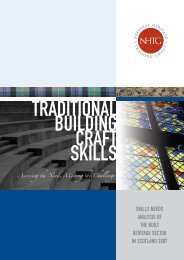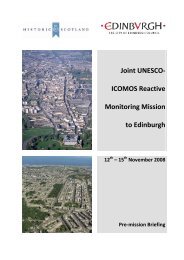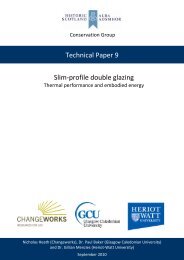NTS Report 4 Aug 2010 - National Trust for Scotland
NTS Report 4 Aug 2010 - National Trust for Scotland
NTS Report 4 Aug 2010 - National Trust for Scotland
Create successful ePaper yourself
Turn your PDF publications into a flip-book with our unique Google optimized e-Paper software.
8<br />
Introduction<br />
1930s Governance unfit <strong>for</strong> 21st century<br />
The<br />
Fulcrum<br />
of<br />
Change<br />
The <strong>National</strong> <strong>Trust</strong><br />
<strong>for</strong> <strong>Scotland</strong> is<br />
over-governed<br />
Slimmer<br />
governance will end<br />
gridlock and set<br />
strategic direction<br />
<strong>for</strong> the charity<br />
Virtually every submission to the Review argues that the governance structures of the<br />
<strong>National</strong> <strong>Trust</strong> <strong>for</strong> <strong>Scotland</strong> have to be simplified and streamlined.<br />
A <strong>for</strong>mer longstanding member of the Board writes: “The culture of constant<br />
consultation is killing us”.<br />
There is general recognition that systems set up in the 1930s, largely lifted from <strong>NTS</strong>’s<br />
big sister south of the border, are not necessarily appropriate <strong>for</strong> a Scottish charity in the<br />
21st century.<br />
Eighty years ago, the <strong>Trust</strong> took the lead in bringing conservation bodies together by<br />
giving them a voice in charting the organisation’s future. And because business<br />
proceeded at a leisurely pace, largely by letter, it gathered large numbers of people in a<br />
big meeting every so often to provide a steer on future direction.<br />
In today’s internet age, decision-making has become much faster. Vast amounts of<br />
in<strong>for</strong>mation are circulated electronically instead of being delivered by post.<br />
Structures inherited from another age mean that <strong>NTS</strong> has around 200 non-executives –<br />
87 <strong>Trust</strong>ees and a further 100 advisers on various committees and panels – engaged in<br />
its business. The Review has been unable to find any other charity with such inflated<br />
<strong>for</strong>ms of governance.<br />
The net result is that paid staff spend far too much time – and close to £500,000 in<br />
expenditure – serving internal structures rather than doing the job <strong>for</strong> which they are<br />
paid.<br />
The clear view of the Steering Group is that <strong>NTS</strong> is over-governed.<br />
There are differences among members, however, on how re<strong>for</strong>m should be carried out.<br />
The Board says that <strong>NTS</strong> is ‘gridlocked’ by its governance and that, in consequence, it<br />
simply cannot get on with decision-making. Submissions from some Council members<br />
argue, however, that they have a statutory duty to act as ‘guarantor’ of the organisation’s<br />
‘integrity’ and point out that, in terms of legislation, they are the final authority on the<br />
delivery of the <strong>Trust</strong>’s core purpose.<br />
So there are uncertainties of where power of ultimate decision actually lies.<br />
Lord Mackay of Clashfern attempted to create a clear division between an executive<br />
role <strong>for</strong> the Board and a policy role <strong>for</strong> the Council in his review of 2003.<br />
That is not quite how it has worked out. The sale of Wemyss House, without adequate<br />
consultation, enraged a number of Council members. They wanted a say in the matter,<br />
and so did many members.<br />
As <strong>for</strong> the Council concentrating on policy development, the Review has seen little<br />
evidence of this. The body is too large and diverse to concentrate on detail. Senior<br />
management staff have a wide range of operational duties and are hard pressed to<br />
provide a steady flow of papers to in<strong>for</strong>m debate.<br />
Given the policy void, some Council members have re-focused on control of a charity<br />
which they feel is losing its way.<br />
As one member, quoting Enoch Powell, puts it: “what is devolved, is retained”. In other<br />
words, Board decisions should be subject to review and recall by what she terms ‘The<br />
Upper House’.<br />
That House – the Council – is itself a broad confederation of interests. The majority of<br />
Council members clearly act only <strong>for</strong> the general good of the <strong>Trust</strong> but some<br />
interventions are made from a sectional or personal standpoint.<br />
Interviews with Council members indicate a general view that they are there to “guard<br />
the guardians” – to keep an eye on the Board. Inevitably this leads to difficulties.<br />
The Review team has been given examples of staff challenging decisions taken by their<br />
Leadership Team, and providing in<strong>for</strong>mation which allows issues to be raised again,<br />
after they have been decided, through the Council or Committees.<br />
This, in turn, has led to what one <strong>for</strong>mer Board member calls “a culture of secrecy” –<br />
“nods and winks, nothing written down, and conversations in corners”.



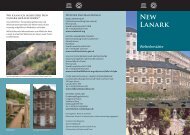
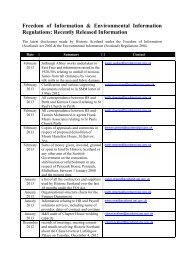
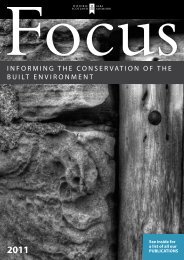
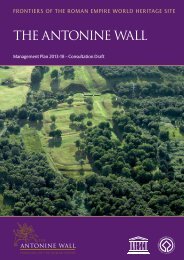
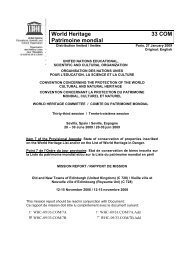

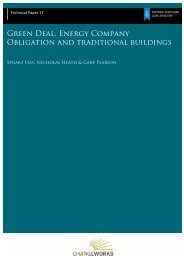
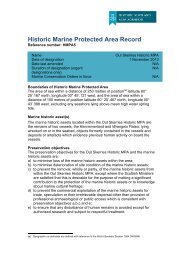
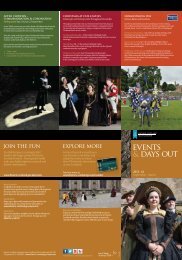
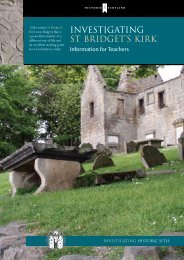
![Elgin Cathedral Wedding Brochure [pdf, 544kb] - Historic Scotland](https://img.yumpu.com/22301571/1/190x151/elgin-cathedral-wedding-brochure-pdf-544kb-historic-scotland.jpg?quality=85)

